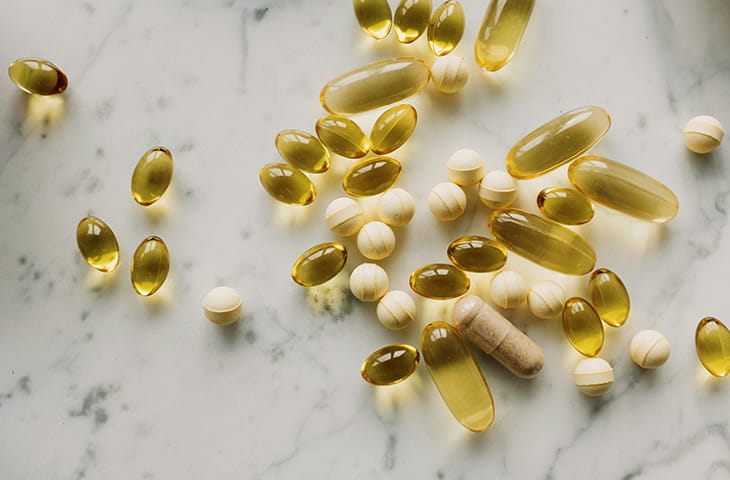Top 7 Vitamins for Seniors: Boosting Health in Your Golden Years

Discover the top 7 essential vitamins for seniors.
As we age, maintaining optimal health becomes increasingly important. Our bodies undergo various changes, and our nutritional needs evolve to adapt to these shifts. One of the key aspects of aging healthily is ensuring that we get the essential vitamins necessary for our overall well-being. These vitamins play a crucial role in sustaining energy levels, enhancing cognitive function, supporting immune health, and maintaining bone strength—all vital components for a vibrant and fulfilling life in our golden years.
Let’s explore the best vitamins for older adults, exploring their unique benefits, how they contribute to your health, and practical ways to incorporate them into your daily routine.
Should Seniors Take Vitamins?
Seniors often experience a decrease in appetite, and their body's ability to absorb nutrients diminishes due to factors like reduced gastric acid production and slower digestive processes. These changes can make it challenging to obtain all necessary vitamins from diet alone. Additionally, certain chronic health conditions and medications frequently used by older adults can interfere with nutrient absorption and metabolism, further exacerbating the risk of deficiencies. So, taking vitamins becomes essential to bridge these nutritional gaps, helping seniors maintain their health.
The Best Vitamins for Seniors
- Vitamin D: The Sunshine Vitamin – Vitamin D offers several benefits for seniors, including supporting bone health by aiding calcium absorption, enhancing immune function, and potentially improving mood and cognitive health. The Dietary Guidelines for Americans recommend a daily intake of 600 IU of vitamin D for individuals aged 51 to 70, and 800 IU for those over 70. Natural sources of vitamin D include sunlight exposure, fortified foods like milk and cereals, fatty fish such as salmon and mackerel, and egg yolks. Ensuring adequate intake of vitamin D can help seniors maintain bone density, reduce the risk of fractures, and support overall health and well-being.
- Vitamin B12: Energy and Brain Health – Vitamin B12 is essential for adults as it supports nerve health, assists in red blood cell formation, and aids in DNA synthesis, which can help prevent conditions like anemia, leading to fatigue and cognitive decline. As aging can reduce the body's ability to absorb this vital nutrient, ensuring sufficient intake becomes crucial. The recommended daily dosage for seniors is 2.4 mcg. Foods rich in vitamin B12 include animal products such as meat, fish, poultry, eggs, and dairy products. Additionally, fortified foods like cereals and plant-based milk alternatives can also provide B12.
- Vitamin C: Immune System Defender – Vitamin C is particularly beneficial for seniors as it plays a crucial role in supporting the immune system, facilitating wound healing, and acting as a potent antioxidant that combats free radicals, potentially reducing the risk of chronic diseases. It also aids in the absorption of iron from plant-based foods, which is important for preventing anemia. The recommended intake of vitamin C is 90 mg per day for men and 75 mg per day for women, with an upper limit of 2,000 mg per day. Sources of vitamin C are abundant and include citrus fruits like oranges, grapefruits, and lemons, as well as strawberries, kiwi, bell peppers, broccoli, Brussels sprouts, and spinach.
- Vitamin B6: Brain and Metabolic Health – Vitamin B6 is essential for seniors as it supports brain health by aiding in neurotransmitter production, which can help maintain cognitive function and regulate mood. It also plays a crucial role in strengthening the immune system and reducing inflammation, thereby helping to prevent chronic conditions like heart disease and arthritis. The recommended daily intake for seniors is 1.7 mg for men and 1.5 mg for women. A balanced diet can easily include vitamin B6 through eating fish, potatoes, chickpeas, bananas, and fortified cereals.
- Vitamin E: The Antioxidant Shield – Vitamin E is crucial for seniors as it supports vision, reproduction, and overall brain and skin health by acting as a powerful antioxidant, protecting cells from damage caused by free radicals. It also helps widen blood vessels and prevents blood clotting, enhancing cardiovascular health. The recommended daily amount of vitamin E for adults is 15 milligrams. To ensure adequate intake, seniors can eat foods high in vitamin E such as nuts and seeds (like almonds and sunflower seeds), spinach, broccoli, and vegetable oils (such as sunflower oil and safflower oil).
- Vitamin A: Vision and Immune Support – Vitamin A is essential for seniors as it plays a crucial role in maintaining good vision, supporting immune function, and promoting healthy skin and mucous membranes. Adequate vitamin A intake also aids in cell growth and differentiation, helping to reduce the risk of chronic diseases such as age-related macular degeneration and certain cancers. Adult men need 900 mcg and adult women need 700 mcg of vitamin A every day to avoid a deficiency. To meet these requirements, seniors should include foods rich in vitamin A in their diets, such as liver, dairy products, and fish, as well as plant sources like sweet potatoes, carrots, spinach, and kale.
- Vitamin K: Blood Clotting and Bone Strength – Vitamin K is essential for seniors, primarily because it plays a critical role in blood clotting, which helps prevent excessive bleeding and bruising. It also contributes to bone health by promoting the binding of calcium, reducing the risk of fractures and osteoporosis. Adult males need 120 micrograms of vitamin K daily, while adult females need 90 micrograms. Seniors can obtain adequate vitamin K by consuming foods like leafy green vegetables (such as kale, spinach, and broccoli), Brussels sprouts, and other vegetables like cabbage and green beans.
Final Say
By incorporating a variety of nutrient-rich foods into your daily meals, you can effectively meet your nutritional needs and avoid deficiencies. Focusing on these essential vitamins will not only support your physical health but also enhance your quality of life. And if you're unsure whether you're getting enough nutrients from your diet, it's essential to consult your doctor. They can provide personalized advice and recommend supplements if necessary, ensuring you maintain optimal health.


